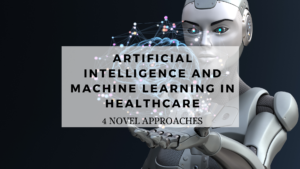
When you hear the words artificial intelligence, what’s the first thing that comes to mind? Driverless cars, Amazon shopping, Netflix movie recommendations and trading software to help bankers. Many think of artificial intelligence in healthcare as a buzz word or just a concept that will fully develop in the near future, but has no impact in your life right now.
Some other household examples of current-day technology that use AI include Siri, Alexa, Google Now – these popular speech recognition software assistants all use artificial intelligence! Recently, Alexa was cleared to handle patient information. Consumer devices such as Alexa and even wristwatches from Apple and other manufacturers are paving the way for how consumer devices will function with AI in providing healthcare and wellness data to help care for and inform healthcare decisions of millions by Americans and billions of people across the world.
Many industries are already using artificial intelligence. Human Resource Management, software development, finance, even the legal field has found uses for AI. What about our healthcare system? What benefits does our healthcare system currently derive from AI?
In today’s post, we’ll be discussing several applications (just the tip of the iceberg) of Artificial Intelligence and Machine Learning in healthcare.
Do you have a family member or friend with diabetes? If you do, you’re probably aware that about one in five patients has some kind of eye problems.
In fact, people with diabetes are encouraged to get eye exams because of the increased likelihood of developing diabetic retinopathy, a condition that develops when the blood vessels in the retina become damaged. If unchecked and properly taken care for, this condition can lead to blindness.
In my podcast session with Dr. Michael Abramoff, President and Founder of IDX LLC, I learned that 20-25,000 people get blindness every year. That’s a huge number!
Fortunately, Dr. Abramoff and his team were able to design a robotic camera that when combined with an algorithm can detect retinal diseases. This special tool empowers primary care physicians to identify the right patients that need the help of an eye care provider. This enables routine check-ups without the inconvenience of traveling to a separate clinic, taking days off work or having to wait in another crowded physician’s office. These applications really make an impact in areas were social determinants are a factor or even in rural communities where traveling a distance to a specialist can lead to additional hurdles to get the exams done.
What an amazing example of using AI to improve access and ease of use in healthcare! He has basically made the eye exam easy and accessible to anyone. This fact even becomes more significant with the fact that in our country, we have a growing number of adults and children with diabetes. With early detection comes the right healthcare which minimizes the number of patients going blind.
Our society has been battling cancer for many years now. Though we’ve made huge improvements in this battle, we still have many more things to learn.
The American Cancer Society said that over one and a half million new cancer cases are diagnosed each year. That’s one-third of our annual birth rate in the U.S. A staggering number!
In a continual quest to help patients’ healthcare, Peter McCaffrey (listen to his podcast interview here), a Biodesign Fellow at TMC Innovation Institute, designed a DNA analysis using machine learning. His focus is on immuno-oncology, a treatment system that uses the patient’s own immune system to attack cancer cells, beat them, and suppress the tumor as it goes forward.
It turns out that the microbiome plays a big role in the immune system. What the bugs do, how they act, how they interact with our gut teaches our immune system to react or go inactive. What Peter’s team developed is an immune system profiling tool that allows patients to be more responsive to immunotherapies. This tool relies heavily on machine learning and AI analysis to discover the patterns from thousands of data samples.
Peter said, “We’re looking at how we can use the microbiome itself that profiles and signatures in the microbiome to tell whether an individual patient will respond to immune checkpoint therapy which is a category of chemo.”
These technologies are proving to be a gateway to improve the precision medicine approaches available to improve outcomes and approach chronic disease management with more of a scientific approach.
According to Dr. Richard Chang (Listen to his podcast interview here), CMO at Kencore Health, one of the biggest challenges faced by healthcare leaders and patients with congestive heart failure is the huge cost of medical care. Another difficulty is the number of increasing patients relative to the stagnant number of providers, especially as the baby boomers enter Medicare age.
Their solution? Use artificial intelligence home monitoring remote biosensors that can be easily integrated into a system. This process allows physicians to gather more information in an efficient manner where the data is filtered and presented effectively so that the physician can quickly transmit instructions digitally through a secure encrypted HIPAA compliant fashion.
What an innovative and modern way of taking care of patients and physicians alike! The quadruple aim at its finest. Kencore has found a great way of merging digital technologies, artificial intelligence with a human touch for some wonderful value-based health care.
Christian Pascual, CEO of Mediktor and his team are using voice technology to deliver preventive diagnostic insights. It turns out, voice biomarkers can be collected through an office visit or even an over the phone QA session that is deciphered by their algorithm to understand if health deterioration is occurring. Voice biomarkers are telling us more than we ever thought we could know about disease prevention thanks to the work of Christian and his team and their ability to harness the power of AI.
We’ve seen several exceptional uses of AI and ML in health care, and that’s just from three podcasts. Artificial intelligence is already transforming our lives from home to the acute care setting.
What other AI technology in healthcare have you seen or heard is making a big difference? What examples of artificial intelligence have you been amazed by recently?
Share your thoughts with us below.
According to the 2020 Centers for Disease Control and Prevention report, roughly 34.2 million Americans have diabetes,...
Read MoreAs a farmer, Rod was used to long days. He worked 18 hours a day, 7 days...
Read MoreWith investors receiving hundreds of pitch decks every year, how do you create a compelling presentation that...
Read More
Brittany Busse Co-Founder, President, and Chief Medical Officer at
ViTelHealth


Stephen Thorne Founder and CEO at
Pacific Dental Services

Keith Carlson Nurse Career Coach